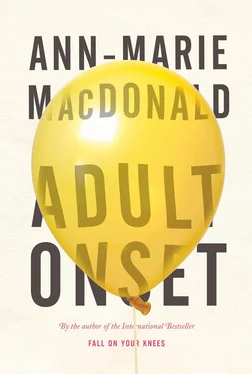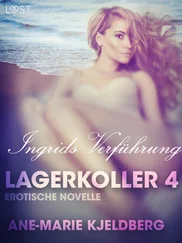It occurs to Mary Rose that this is the first time, outside infancy, that she has cried in front of her father. Then it occurs to her that it is the second time, because there was that time in the bathtub … It is not that she forgot — it is more a trick of filing; as though she had tossed the bathtub memory on the hall table along with the mail twenty-three years ago and there it has lain, unregarded, like Poe’s purloined letter.
Suddenly Dolly looks straight at her.
“I know about your mail situation, Mary Rose.” She opens her purse, and withdraws the Living with Christ pamphlet. “How do you like that, I never mailed it at all. I’ve been carrying it around this whole time.” She takes the brown “Sunday Offering” envelope from between its pages and hands it to Mary Rose.
Mary Rose opens it. A creased black-and-white photo.
“I meant to frame it before I sent it to you,” says Dolly.
In the photo, Mary Rose stands between her mother and her sister, looking down at the stone, flush against the grass. It is etched with letters and numbers that are fuzzy and will be likely fuzzier under magnification. Mary Rose’s dress is white like the stone, while draped across her left shoulder is her mother’s sweater. And resting there, offering comfort along with the warmth of the sweater, is her mother’s hand. It strikes her suddenly: the sweater is covered in a floral pattern. Tulips.
“Thank you, Mummy.” Mary Rose is more surprised by this word that has slipped out and shown its tail, Mummy , than by the photograph. After all, she already knows what is written on the stone.
“The dates’ll be there,” says Dolly, putting on her reading glasses, leaning forward to look. “Although you might need a magnifying glass.”
“It’s okay, Mum. I’ll look when I get home.”
“What’ve you got there?” asks Duncan, putting on his glasses, reaching for the photo. Mary Rose hands it to him. He looks at it and nods slowly. “Well, well. I remember taking that.”
“What time of year was it, Dad?”
“We placed the stone in springtime,” he says, and closes his eyes.
Dolly pipes up. “I found it in my jewellery box! What was it doing there?”
“Did you take it from the photo album, Mum?”
“I must have. Unless — Dunc. Dunc, dear, did you take this photo out of the album?”
“Why would I do that?” he asks, his voice a little husky.
“Because it’s … a sad picture?” says Mary Rose.
He doesn’t answer.
“Dad, Maureen sent me a link to a site … Canadian military graves abroad, I’ll forward it to you. Dad?”
He opens his eyes, his brows elevate congenially, his lips compress in a good-natured upside-down smile. “What’s that, sweetie pie?” He turns his blue eyes to her.
I love you, Dad .
“How’s the genealogy going?” Her heart is shredding.
He sits forward. “Well now, there’s a fella in Boston, name of Jerome MacKinnon, he’s an accountant with Deloitte, and it turns out he and I share a marker on the Y chromosome, which puts us right back to the Clearances .”
Dolly’s eyes narrow, she speaks slowly. “You know, that must have been a hard time, when I think about it.”
“Don’t think about it,” says Duncan.
Andy-Patrick helps himself to a chocolate tile and offers the tray to his mother.
“Mmm, ever good,” says Dolly, her mouth full of vowels.
“Let’s go, Doll Face, we got a train to catch.” Duncan helps his wife to her feet and she steadies herself on his arm.
“Did you want the moonstone, Mary Rose? Here, you have it.”
“That’s okay, Mum, I’m really happy to have the photograph, thank you.”
“I’ll take it,” says Andy-Patrick.
“What do you want with a lady’s ring?” says Duncan.
“He can give it to Mary Lou,” says Dolly.
Andy-Patrick opens the velvet box and slips the ring on his pinky. Duncan rolls his eyes and shakes his head, but grins and slaps Andy-Patrick on the shoulder.
“Bye, Dad,” says Mary Rose.
He bonks her on the head. “Thanks for coming to see us off, Mister.”
The redcap greets them by name and laughs at something Dolly says. Duncan beams with pride, and they mount the narrow escalator up to the platform. Two little old people in bright clothing. Near the top, they turn and wave, then disappear.
Somewhere, a train has disgorged a tide of commuters that washes past them now. She goes to slip the photo back in its envelope.
“Can I see?” asks Andy-Patrick.
She hands it to him.
“What’s that you’ve got on?” he asks.
“Mum’s sweater.”
“Looks more like a scarf.”
She looks over his shoulder.
It’s a sling.
Because she fell, or was pushed, punished, rescued. Or it was a cold day. Or it was warm.
“What’s the matter?” he says.
She speaks before she is aware of formulating the words. “You helped me.”
“What do you mean?”
“That time when Mum called and asked you to come for supper? You said, ‘I can’t, Mary Rose and Renée are here.’ ”
“Yeah?”
“And then …” We can’t know which words will undo us. She waits until she can trust herself to speak. “It was over. The whole bad time.”
He hands her a hanky. “It’s clean.”
“I’m sorry.”
“At least you’re not crying and driving.”
“I mean I’m sorry for being a shit to you, A&P.”
“You’ve never been a shit to me.”
“Yes I have.”
“I’ve deserved it.”
“I’m bored with being a shit to you, I’m bored with you deserving it.”
“Okay.”
“I’m amazed you carry a hanky.”
“Chicks love it.”
“You carry it because you cry.”
“Chicks love it.”
She puts the photo in her pocket.
He says, “Can I ask you something? Don’t be mad.”
“What?”
“Would you call me Andrew from now on? Or at least Andrew-Patrick?”
“Sure.”
The streetcar rattles up Bathurst Street past Toronto Western Hospital and she notices Balloon King is gone, in its place a Starbucks. At the corner of Bathurst and Bloor, she glances out the window for a trace of herself — this happens quickly, such that it slips into consciousness as “normal.” Is that all there is to insanity? Slow it down: she has just turned her head, looked out the window and searched the crowd at the intersection to see if she was among them holding a bunch of tulips. She was not. She pictures swift faeries, a legion of puckish creatures chuckling as they trip through the regions of her mind. Is this what happens when you stop being angry for a moment? The light turns green.
Someone saw what happened to the flowers. There is always a witness. She shared a moment of her life with the people and pigeons at this corner yesterday, now they have dispersed and what is to say it mightn’t have been an important moment?
She gets off the streetcar at the subway station and continues on foot up Bathurst. “You pick yellow,” Winnie said. And she said something else too … “You buy only one.” Mary Rose goes cold. What if she never had the first bunch of yellow tulips at all — what if she hallucinated them? But that could have been the language barrier, Winnie may have meant, “I want you to pay only for this bunch, not the previous bunch.” She stops outside Archie’s Variety — the voice of Kiri Te Kanawa soars out, “Swing low, sweet chariot …” She could pop in now and ask, “Winnie, did I leave with yellow tulips the first time I came in?” What if Winnie replies, “No. You come only once”? Would that prove Mary Rose went missing for … the amount of time it took to buy tulips? Has she lost a piece of time? It is one thing to speculate as to the existence of parallel worlds, it is another to realize you may have entered one. That is not science fiction, that is psychosis. Unless the other worlds are real … indeed, they are more mathematically probable than she herself is. Was the whole episode an especially vivid déjà vu? Winnie might be mistaken — forgetful, like the best of us. How can Mary Rose know for certain? Winnie waves to her from inside the store. She waves back, and keeps going.
Читать дальше












